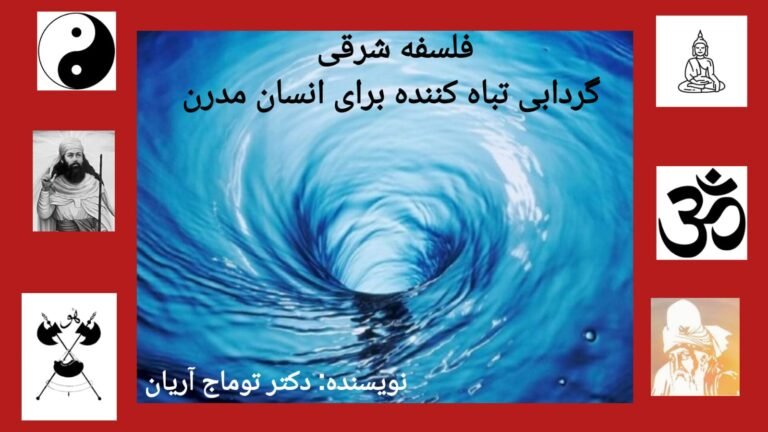Author: Dr. Tomaj Arian*
Eastern philosophy reflects the Eastern man’s view of the world, the universe, human relationships, power, government, and society.
Eastern philosophy can be considered Chinese philosophy, which includes Confucianism and Taoism, Indian philosophy, which includes Buddhism and Hinduism, and to some extent Iranian philosophy, which includes mysticism, Sufism, and professional dervishism.
Eastern philosophy does not view phenomena as material, and considers everything to be beyond matter and physics, and considers human perception and perception to be a small part of the truth. Everything in Eastern philosophy is metaphysical, and humans are unable to understand all of it.
The perspective of Eastern philosophy is introspective, meaning it recommends change from within, and for this reason, it encourages seclusion and distance from society.
In the eyes of Eastern philosophy, accepting fate is a principle, inevitable and unchangeable. This can be clearly seen in the views of Buddha and Lao Tzu, the founder of Taoism, who both recommend the principle of inner knowledge and seclusion. Sufism and mysticism have exactly the same view in Iran. Surrender to fate, seclusion, and dependence on metaphysics are characteristics of Iranian philosophy.
Although Western capitalism has swept across all Eastern societies, Eastern philosophy still dominates in the East, focusing on finding happiness and individual perfection, and a dusty and mysterious spirituality is the ultimate philosophical perfection in the East.
Eastern philosophy, considering the geography of the East, which is agricultural and dependent on large rivers, always seeks origins and sees origins in distance and isolation.
Isolationism and internal structure are prominent characteristics of Eastern philosophy, which has caused the changes in society to be considered an unimportant issue, and a civil society is not created in it, and a static and hierarchical system has emerged from this philosophy.
Eastern philosophy recommends flexibility, meaning that one should move past the problem rather than confronting and solving it. The advice of Eastern philosophy is to flow like a river and pass through everything.
In Eastern philosophy, there is no incentive to explore material matters and complex social relationships.
Eastern philosophy is therefore based on reincarnation and the fact that beings return to the world in another form after death, and this issue has destroyed the spread of civilization and expansionism in Eastern philosophy.
Eastern philosophy is based on self-denial and is the enemy of individualism.
Eastern philosophy is not expansionist and recommends stillness, which is why trade and industry did not emerge in the East as they did in the West.
The denial of individualism in Eastern philosophy destroys individual independence and deprives the individual of the possibility of modern thought.
In Eastern societies, civil society has never been formed, and government responsiveness is reprehensible and strange. Governments in Eastern societies have been and are, without exception, authoritarian, and deny the possibility of change.
Even in India, where democracy has spread under British rule and administration, social classes still have the upper hand, and people are given status based on class and caste, and questioning is reprehensible in India.
In Iran, mysticism and Sufism are also prevalent, and since the time of Zoroaster, the principle of self-improvement and non-interference in everyday affairs has been recommended. Isolation and seclusion are common, and questioning is considered undesirable. This historical thinking has caused Iranian society to remain stagnant and silent in the face of oppression.
Eastern philosophy is like a poison that is injected into individuals in each generation, and this poison is passed down from generation to generation, perpetuating corruption.
What is the solution?
Thousands of years of written human experience best explains the solution.
The spread of individualism and emphasis on matter and physics, the expansion of civil society through bottom-up questioning, collective consultations through modern phenomena such as the Majlis and Parliament that revive the sense of human participation in society and their determining role in their society, the spread of materialistic philosophies and the ideas of Western thinkers, the rejection and prohibition of the philosophy of seclusion and submission and metaphysics such as Buddhism, Taoism, religious dervishry, mysticism and Sufism as corrupting human thought,
Avoiding the idea of self-superiority in Eastern philosophy, meaning that one’s own thinking and race are superior to others, rejecting xenophobia and hostility in Eastern societies, meaning that people from other societies are no longer enemies and their thoughts are respected, and changing the view of hostility to friendship and humanity towards people from other societies.
In Eastern societies, we see that with the expansion of industry and technology, instead of these societies moving towards the expansion of humanism and civil society, the government systems in these societies become more closed and authoritarian, and armed with dangerous weapons such as atomic and chemical bombs that may face great dangers to the planet at any moment.
Prominent examples of these can be seen in China, North Korea, Myanmar, Turkmenistan, Iran, and Russia.
This type of government is rooted in the history and culture of these societies, which is hierarchical and top-down. The type of government is completely intertwined with the philosophy and culture of these societies. As long as these philosophies persist in these societies, there is no hope for the future of these countries or even the planet.
The combination of Eastern philosophy and technology is a toxic combination that endangers the world.
End
*PhD in Political Science, Writer, Political Analyst

